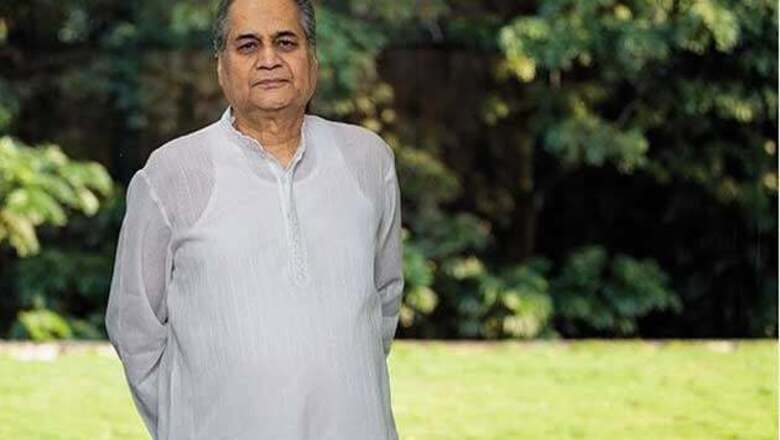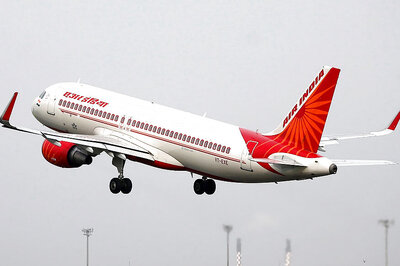
views
Rahul Bajaj
Chairman, Bajaj Auto
Age 75
Rank in the Rich List - 20
Net Worth - $3 billion
Key Learning - Every top business school today teaches family business. The basic principles that come to my mind are love, truth and non-violence. You follow those, then there will be no problems. If you don't, then that gives rise to ego, selfishness, greed and pride.
Advice to other business families - Be reasonable. Believe in give-and-take and don't be greedy.
Rahul Bajaj is unabashedly confident-after all, he has been there and done that. At his office in Akurdi, on the outskirts of Pune, he casually chooses where he wants to sit on the couch. During the interview, he turns a question around to check if you really mean it. He poses for a photograph. He raises his voice while making a point. He laments that interviews for which he has budgeted one hour almost always take two. And, in his own inimitable style of brashness mixed with worldly wisdom, Bajaj, 75, talks about his idea of wealth creation and lifestyle, the spat with brother Shishir, differences with son Rajiv and the aversion to debt.
Consider the facts. Bajaj has been a constant feature on the Forbes India Rich List. This year, he is ranked 20th and his total wealth is estimated at $3.1 billion. It has dropped marginally from $3.4 billion last year (as has his rank from 19) but, in the last four years, Bajaj has almost doubled his wealth. Today, the Bajaj Group is among the largest corporate houses in the country. The Group's total revenues stand at $7.3 billion, with a market capitalisation of about $14.6 billion. It has 40 companies across businesses such as two- and three-wheelers, insurance and steel; and it employs more than 33,000 people. Now, you can't really argue with this kind of success. Or that level of confidence.
Q What is your idea of wealth creation?
I am no saint...People often ask this question: Why do you run a business? Generally, they say it is to make money. That is not fully correct. It is alright in a limited sense. What is right is this, and I am just repeating what was said by Peter Drucker, the smartest management guru in the world, many years ago: The purpose of business is to satisfy the needs of the customer. If you make motorcycles and nobody buys them, you will go bankrupt like companies which are not customer centric.
Take care of the customer. If you cheat him, give him bad quality, charge him more than you should, he will not buy and you are in trouble. This is not a charity mindset. It is an enlightened, 'good businessman' mindset.
In 1971, the MRTP commission report stated that 'Rahul Bajaj did not take advantage of the ten-year delivery period of the Bajaj scooter [excess demand over supply], even though the premium [people were willing to pay] on the vehicle was much more than the profit. And his is the lowest priced scooter in the market.' But this enabled Bajaj Auto to become one of the most profitable and fastest-growing companies in the 1980s. That is the philosophy of creating wealth. I am proud of what I have achieved. And whether I made one dollar or a billion, the question is how I did it. I am not a Gandhi. Subject to that, I am proud of how I made my money. I am not saying I have never made a mistake. But I have not consciously cheated anyone or done anything corrupt.
Q You have done well for yourself. Has it affected your lifestyle choices?
First the yes: I have a large office and a large home. I have big cars and, for some time, we have had an aircraft for our business needs, comfort and convenience. Clearly, all of this shows to an average man that you are a rich guy. Now, the no: When I came back in August, 1964, after completing my MBA from the Harvard Business School, I came to Akurdi. My wife and I travelled economy class. I was a Bombay boy; I did my schooling in Cathedral there. I went to St Stephen's College in Delhi; I studied law at the Government Law College in Mumbai and then did my MBA in Boston. Akurdi was a jungle at the time. There was no school, college, hospital... nothing.
Name one industrialist who did that, anyone from cities like Calcutta, Bombay, Delhi and Chennai. Did they go to a small place and stay there for over 40 years? People might visit their plant once or twice a month. If you are training at a plant, you will maybe stay there for a year or so. I came here in January, 1965, and I am still here. I didn't even shift to Pune. What kind of a lifestyle will you have in a factory colony which works three shifts? Parties that start at 9 or 10 pm and, like in Delhi or Mumbai, go on till 2 am? You can't do anything like that. And that's been the lifestyle for the first 25 years; even now-though, during the last few years, I started travelling more.
So, after a year or so in Akurdi, I was asked, 'you are still there'? I said 'yes of course, and I intend to continue to stay here'. I may have had a problem if my wife was different. But Rupa fully supported me. I am originally from Rajasthan. She was a Maharashtrian. I am from an industrialist family. Her father was an ICS officer. All my three children grew up here. I didn't live like a fakir even in the early years. But since the last few years, my lifestyle has changed.
Q You had a bitter split with your brother Shishir. Can you tell us more about this phase of your life?
The business started with my grandfather Jamnalal Bajaj in the 1930s. He had two sons, Kamalnayan and Ramkrishna, and ours was a joint family. They grew the business substantially because Jamnalalji lived like a saint; he died at the age of 52 in 1942. What he had, he gave away [to Mahatma Gandhi]. Major industries were built by his two sons after 1947. My uncle Ramkrishnaji was in jail from 1942 to 1946. They [the two brothers] were close-they were the Gandhian type so there was no question of separation. Both were brought up in Gandhiji's and Vinoba's [Bhave] ashrams. Kamalnayanji had two sons-Shishir and I-and a daughter, Suman. And Ramkrishnaji had three sons: Shekhar, Madhur and Niraj. We consider ourselves to be five brothers.
Most of the top business schools today teach family business: How to stay together, communication, adjustment, and so on. The basic principles of life, to my mind, are love, truth and non-violence. If you follow them, then there are no problems. If you don't, then it results in ego, selfishness and greed. We did well till 2000-and then something went wrong. Till today, four brothers are together. I believe Shishir too may not have separated. He has two sons, Kushagra and Apoorva. Kushagra is very bright and very ambitious. He wanted to expand fast and did so. Bajaj Hindustan is the largest sugar company in India but the whole sugar industry is in difficulty as it is a political sector.
The official separation happened in 2008 but their desire to separate became clear in 2000. It took us by surprise. Kushagra wanted to do business differently and wanted to grow faster. I was conservative and hence there was no reason for us to prevent the separation.
Yes, families split and businesses go up and down. But please understand that if there are two brothers separating, you have to divide the business in two. When you have five brothers and one is leaving, then you don't have to divide the business at all. We are all paying income tax; we all have our own wealth. Even in Bajaj Hindustan, we [the four brothers] were the majority. But I and my brothers decided that he [Shishir] was managing that business and so we should give it to him.
There has been no adverse effect on the Bajaj Group whatsoever. In fact, the market cap of our group companies has increased by three times since the separation.
Q What would you advise other family businesses?
Communicate regularly. Be reasonable. Believe in give and take and don't be greedy. The strongest should be magnanimous.
Q People say that you are aggressive, egoistic and brash. So how are you four still together?
That is what you are saying. Ask Shekhar, Madhur and Niraj. Yes, I perhaps have a strong personality.
Q You are very confident about the sustainability of the structure...
This is how it has been for the last so many decades, no? Only Shishir split.
The Pune group companies [Bajaj Auto and the Financial Services companies] are looked after by my two sons, Rajiv and Sanjiv, respectively-their combined market capitalisation is about Rs 80,000 crore. Mukand and Bajaj Electricals are in Mumbai and are looked after by my brothers, Niraj and Shekhar, respectively. Now, they are equal owners and are the uncles of the two boys. They are in their 60s while Rajiv and Sanjiv are in their 40s. Why are they not shifting here and asking to manage these companies? Two reasons: One, they are reasonable and good people. They recognise that to a large extent I built the company. They feel I need to get some credit for that. I can't demand it. That would be wrong.
Two, everyone's future rests on how well these companies do. They know that Rajiv and Sanjiv are good managers.
Q A lot is made of the disagreements between you and Rajiv. What is a typical Rahul and Rajiv Bajaj discussion like?
For that, the answer has to come from both of us. From my point of view, Rajiv is outstanding. He is brilliant. However, he has not appointed me chairman; I have appointed him managing director. Having said that, I am proud of his capabilities and proud that he is not my clone. Yes, he decided to stop scooter manufacturing even when I wanted it to continue.
When I was the MD and CEO, I did what I considered right after listening to my colleagues. Now he is the MD and CEO, I let him do what he wants after listening to me and the board. We disagree only on a couple of issues but, for 90 percent of the time, we agree. If we didn't agree then the company wouldn't have done well and he himself would not have been here. On the other hand, if we agreed on everything, then he would be a chamcha. He definitely is not. Also, I don't want a chamcha as a son or as a managing director.
Q But wasn't there any disagreement in the initial phase? For instance, over the idea of a new plant?
From 1990, when Rajiv joined the company, to around 1998, there was no disagreement. He was involved in production and the shop floor during that time. The Chakan plant came up only around 2000. That's when Pulsar happened. I asked him: We have 500 acres of land available in Waluj, Aurangabad; why do you want to buy 200 acres in Chakan? He gave satisfactory reasons such as proximity to the corporate office and our R&D facilities, etc.
Till 2005, I was the chairman and the MD. I have, however, been delegating powers to him since 1998. Nobody initially believed that an owner-chairman-aggressive, strong minded-would delegate. But I did. It was the right thing to do. I started delegating to Rajiv in 1998. Not once did Rajiv ask for a designation. All he wanted was to work with the condition that I don't breathe down his neck. He said you have worked for 40 years; if you still want to do this, then go ahead-but I will go and do something else. When you want to give it to me, then hold me accountable and leave it to me. And he has been very good. A company can't afford to let someone manage, if he is not good.
Sanjiv became the CEO and MD of the financial services companies with effect from 2007 when I split Bajaj Auto into three companies.
Q Why the aversion to borrowing?
In our Pune group companies, excluding the two insurance companies which also have a large amount of cash/cash equivalent totalling to about Rs 30,000 crore, we have cash/cash equivalent of about Rs 35,000 crore. Most of it is with Bajaj Holdings & Investment Limited [BHIL]. Even with 1:1 debt equity ratio, we can easily raise debt of Rs 35,000 crore for new projects. So why am I not leveraging?
Since I became the CEO of Bajaj Auto in 1968, I have followed the principle of remaining focussed on what we were doing [manufacturing two- and three-wheelers] and wanted to be a zero debt company as soon as possible. Due to this, we have remained a company focussed on two-and three-wheelers/light commercial vehicles and have no debt at all.
There are other large industrial groups who have both diversified and taken a large amount of debt. Quite a few of these are in difficulties today. Some promoters have lost their reputation. On the other hand, Bajaj Auto's market cap is about Rs 55,000 crore and we did not diversify at all. It has an after-tax profit of about Rs 4,000 crore. How many manufacturing companies in the private sector in India have a market cap and a net profit more than Bajaj Auto? Not too many. Obviously, we have done well for ourselves without debt.



















Comments
0 comment